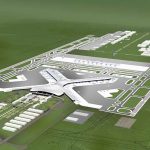Portugal – fresh opportunities
The intervention by the political thinker, writer, military hero and journalist Colonel Manuel Pedroso Marques at a lunch organised by the International Club of Portugal at the Sheraton Lisboa Hotel & Spa on December 7 held out he promise of fresh opportunities for Portugal.
Instead, what we got from the founding member of Portugal’s Socialist Party (PS) and revolutionary brave-heart who has published several books including ‘The Future in Play’ (‘O Futuro em Aberto’) in which he makes a counterpoint between a progressive spirit and conservatism, was an extensive and perceptive list of Portugal’s ills that would discourage even the most dedicated physician.
This latest book, published in Portuguese, has been viewed as somewhat prophetic since it hints at the fragility of the current PS socialist government and its uncertain future — a government which indeed fell within days of its publication precisely because of some of the inherent constitutional models it has adopted — but which accompanies and gives opinions on recent events which have been taking place around the world including the War in Ukraine, the conflict in Palestine/Israel, and the political tensions between various nations such as China and the US.
Colonel Manuel Pedroso Marques is an interesting fellow. He was involved in the Beja Revolt which aimed to overthrow Salazar’s Estado Novo dictatorship in 1962- a brave and risky venture indeed — and forced to flee Portugal and live in exile until the revolution.
The former president of the Lusa news agency (1995-2003) and RTP (1975) has always argued that one of Portugal’s weak points is a “tendency to improvise” rather than plan, as well as having difficulties in making decisions that are imperative for the State – the location of the new Lisbon International airport being one of them.
Another of his popular books is ‘Improbable Dialogues – The Populist, Democracy, The Radical and Public Opinion’. (‘Diálogos Improváveis – O Populista, A Democracia, O Radical e a Opinião Pública’) which was also echoed in his talk.
The need to think about the future
Manuel Marques said the future was littered with uncertainties which naturally left people concerned. However, what set modern times apart from antiquity is that in classical times people were only concerned about disasters that had happened, whereas today is that we also think about things that could happen in the future, and agreed that only by thinking about the future could bring about fresh opportunities.
Turning to the current crisis shaking Portugal (the government fell and fresh elections have been called for March 10, next year), the author, entrepreneur, political thinker and journalist referred to a chapter in his latest book that explains some ideas that are linked to the causes of the current political crisis.
Some political figures and thinkers, he believes, fear that a concentration of powers since the launch of the constitution after the April 25 Revolution, has had negative aspects because It could pave the way for another authoritarian regime of the type that had existed under Salazar. André Ventura and the populist party Chega might spring to mind for some in this respect.
The downsides of a semi-presidential system
The result, as can be seen, is a multiplicity of institutions governed by a minefield of weak and confusing laws “on this, that and the other” to consult in almost every sphere of life, for specific authorisations ,and which “slow down progress in our country and the efficiency of the public administration”.
“The current political crisis would not exist in a presidential regime, and what we have in Portugal is a semi-presidential regime*,” said the political philosopher, which in effect meant a system of government that was also semi-parliamentary.
For those who don’t know, a semi-presidential republic, or dual executive republic, is a republic in which a president exists alongside a prime minister and a cabinet, with the latter two being responsible to the legislature of the state.
“So if you have a semi-presidency and a semi-parliamentary system what kind of government do you get? You end up with either a government or no government; there is no semi-governance,” said Manuel Pedroso Marques.
He said that when two “semis” joined together the situation for the government becomes more difficult, which isn’t positive, because it causes management difficulties.
The fragmentation of power, he said, dissolves it, while the concentration of power strengthens it. This can be seen in both military and organisational strategies.
In other words, it can create a sense of confusion towards accountability, as there is no relatively clear sense of who is responsible for policy successes and failures. It creates both confusion and inefficiency in the legislative process (parliament), since the capacity of votes of confidence makes the prime minister respond to the parliament.
The writer said that the mistake was thinking that a strong democracy was “an automatic given”, that we have no reason to be afraid in a democratic state. “Either there is power or there isn’t. That it’s powerful or weak. The idea that power is abstract and exercised for good or ill”.
This confusion, he said, lay in the origin of the defence of dictatorships, with the idea that democratic regimes are weaker and don’t have authority.
China and US hegemony
The Chinese leader Xi Jinping believes that autocratic bureaucracies get more thing done than democratic regimes, and argues that’s why China is on the rise economically and the West is falling into decadence.
He also said that economic rivalry and political hegemony that the United States does not have to confirm what is called in political and sociological terms a Thucydides’s Trap* – the Chinese leader has called for a rejection of hegemonic power structures in global governance being seen as a trap, saying that the world wants justice not hegemony. (*Thucydides’s Trap, which refers to the natural, inevitable discombobulation that occurs when a rising power threatens to displace a ruling power… [and] when a rising power threatens to displace a ruling power, the resulting structural stress makes a violent clash or war the rule, not the exception)
But this theory, the colonel points out, is not always the case since there have been many cases of established power and rising powers in which there was not a war and the independence of Brazil is a case of point. (However, the independence of the United States did lead to war with France against Great Britain)
The world does in fact have hegemonic powers and the US is one and China is an emerging power.
“China wants to affirm itself on the international stage and to do so it has to trade, and who likes doing business doesn’t like wars*. (*Not so sure when it comes to construction companies and arms manufacturers, and again the US is a case in point).
So, that might mean what Xi Jiping has referred to as a “peaceful rivalry” while pursuing a “policy of ambiguity”
“Our democracy has weaknesses, difficulties, defects, but this is the case of all democracies in all parts of the world where they exist. The bugbear of democracy is that it never lives up to its own ideals. Democracies always fall short and strive for more, while dictatorships are self-satisfied and don’t accept social or any other criticisms” said the political thinker.
And this has led to the idea that leftist regimes always face more social pressures and strikes than regimes of the right, with many examples of this in Portugal with left-leaning governments rather than right-leaning ones.
Pursuing strategies
The writer also discussed in his book the Portuguese inferiority complex, the idea that Portugal has always lacked strategy, which, he said, was untrue and that throughout its history it had always had strategies, but that many such were reactive, initiated to control situations in the present rather than long-term strategies for the future.
But one that was future-looking and served Portugal well over the centuries was her alliance with England – the oldest unbroken alliance in human history – Portugal needed it to defend itself against Spain; and largely driven by the nations’ common interests as maritime countries on the edge of Europe and close to larger continental neighbours, dating back to the Middle Ages in 1373 with the Anglo-Portuguese Alliance. It also interested England to stem Spanish, French and even Prussian power.
Corruption
But the colonel warned that trust or rather a lack of it seemed ingrained now in Portuguese society with 90% believing that the government is corrupt, politicians also, and that the country is equally so. According to Transparency International it is the 32nd most corrupt country. According to Luís de Sousa, Portugal has not been exempt from corruption scandals. “By the mid-1990s, transparency and the moralisation of political life had come to dominate parliamentary debates and reforms. The illegality surrounding party life must be seen against the background of dominant ethical standards in society. Voters appear tolerant of the unethical behaviour of political leaders, while parties are gradually becoming less responsive to their electorate. Representation and delegation rely more on tacit consent than on voice, thus encouraging complacency over corruption”, says the political and social sciences researcher at Lisbon University.
However, only 3% of the Portuguese, says Marques, claimed to have been subjected to being bribed or corrupted. “The difference between reality and perception couldn’t be greater”.
Administration – in a critical state
One area in which Portugal falls down badly is administration, and this goes for both the private and public sectors, contrary to technological abilities which are good and often very good.
“This deficiency of administrative action translates into the poor capacity the Portuguese have in planning” and gave the example of urban transport planning and the curious anomaly of having Campo Grande and Entrecampos railway stations so close together, instead of designing one main station. “This was done to protect and serve particular interests” rather than the “general interests” for the public good.
And then there was Portugal’s incapacity to take decisions which, he said, was “worrying”. “When indecision becomes ridiculous then any decision is good”, he said mentioning the new Lisbon airport project.
Portugal’s problem of poor productivity was another problem highlighted by the colonel, with Portuguese labour earning less than German workers while the costs per unit of goods produced is higher, on average than in Germany.
All of these problems overall he put down to the poor governance of the Portuguese State and the community of individuals, and the not always healthy relationship between them. “We have to evolve and change” he said.
So, what are the opportunities for the future in the optic of Colonel Manuel Pedroso Marques? He didn’t mention them. Perhaps the opportunities lie in putting right the catalogue of things wrong with Portuguese governance and society? Or perhaps the respected gentleman is another old man of Restelo like Henrique Medina Carreira? Or maybe you just have to buy the book to find the answers to this conundrum that was referenced by the great Portuguese writer Eça da Queiroz as long ago as in the 19th century? Perhaps, at the end of the day, all countries are dysfunctional, but each country is dysfunctional in its own unique way.
Text: Chris Graeme Photo: ICPT










